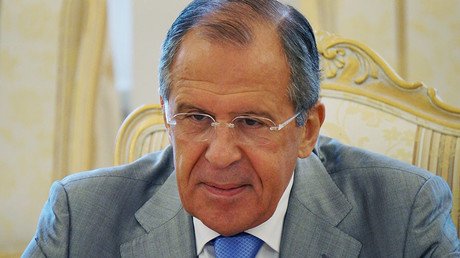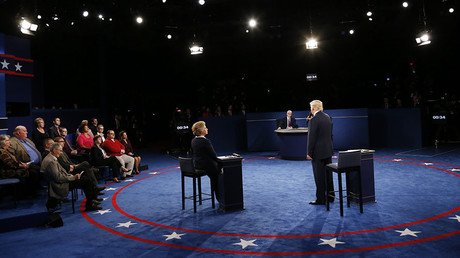‘To save lives, one should be pragmatic’: Lavrov promises peaceful practical steps on Syria
Russia believes that resolving the Syrian crisis requires practical efforts from all actors that have real influence on the ground, Russian Foreign Minister Sergey Lavrov told CNN, adding that a peaceful resolution to the situation in Aleppo is still possible.
“We want to have a meeting of the countries that have direct influence on what is going on on the ground in Syria, either by being there … or through financing and supplying arms to the opposition,” Lavrov told CNN's Christiane Amanpour, adding that it would be a meeting “in a narrow format” involving Russia, the US and “some regional powers.”
Image of 5-year-old Syrian boy Omran Daqneesh is "a tragedy," and moderates "must separate themselves from Nusra," says Russian FM Lavrov. pic.twitter.com/wxPzQ7J9Ig
— Christiane Amanpour (@camanpour) October 12, 2016
The diplomat also confirmed that the meeting, which will also be attended by Turkey, Saudi Arabia and Qatar, is scheduled for the coming Saturday. He said he hopes that it will be “a business-like discussion and not some general assembly-like debate” that would allow the sides to launch a real dialog based on the US-Russian agreement on Syria reached in mid-September.
Lavrov believes the involvement of regional players is necessary as the US is apparently not as influential on the ground as it claims.
“The key problem is the total inability of the US and the other members of the US-led coalition to separate the moderates from Al Nusra [Front],” Lavrov said, adding that the US, including CIA chief John Brennan, assured Russia in February that it needed two weeks to separate the moderate rebels from Al Nusra and “they never did it.”
Russia got “an impression that what the US and [their allies] really want is to spare Al Nusra [Front] and to keep it in case they decide to use a ‘Plan B’,” the minister noted once again.
“I do not want to suspect the US of encouraging terrorism but what they do in the case of Al Nusra makes me very suspicious.”
“We launched the ceasefire only to see the US coalition attacking the positions of the Syrian army three days after it was launched,” Lavrov said, referring to the US-led coalition airstrike on Syrian army positions in the eastern Syrian city of Deir ez-Zor besieged by Islamic State (IS, formerly ISIS/ISIL), which took place on September 17.
“They said it was a mistake, but I read [the] statement of official Pentagon representative, Colonel Thompson, who said that this strike was prepared for two days and was based on very good intelligence,” Lavrov said. “Immediately after this mistaken strike, Islamic State launched an offensive in Deir ez-Zor.”
Peaceful resolution in Aleppo still possible
Speaking about the situation in Aleppo, Lavrov said that Russia still “strongly supports the initiative by [UN Special Representative for Syria] Staffan de Mistura, who proposed that Al Nusra fighters should be [allowed] to leave eastern Aleppo with the weapons ‘in dignity’” along with the moderate rebels that want to “stay with them.” Rebels who want to stay in Aleppo, meanwhile, should join the cessation of hostilities, he said.
“We are still convinced that this plan of de Mistura's should be given a chance and we are working on it with the people on the ground,” Lavrov said, stressing at the same time, that “otherwise you cannot really expect the army of Syria to stop fighting Al Nusra, which is trying to use civilians as human shields.”
“It is civilians we think about when we support de Mistura’s plan,” the minister said, adding that Russia “tries to take all necessary precautions” in its operations in Aleppo and “advises the Syrian army to be very [precise] when targeting Al Nusra.”
All accusations should be backed by evidence
He also once again dismissed accusations that Russia has committed war crimes. “All the statements have to be verified,” he said, adding that no evidence proving these accusations has ever been presented to Russia.
WATCH MORE:
Speaking specifically about the UN aid convoy that was attacked near Aleppo on September 19, Lavrov said that Russia “insisted on the investigation of the attack on the humanitarian convoy” and “strongly insists that anyone who has information related to what happened should submit the information” to the UN Secretary General Ban Ki-moon, who launched an investigation into the incident.
At the same time, the minister said that Russia is “open for discussions” with the West and has "never cut connections" with its western partners. He added that Russia’s goal is to uncover the truth about what exactly happens in Syria “instead of accusing each other without any justification."
He also noted that the US gets “a feeling that they are losing the ability to decide for everyone” as the world “is really becoming multipolar,” adding that it is “painful” for the US and forces them to use anti-Russian rhetoric.
The minister said that Russia takes such behavior “with patience” and prefers “be guided not by hysterical Russophobic statements but by a business-like approach.”
“If we want to save lives we have to be very pragmatic,” Lavrov stressed.
Russia, US are not on brink of war
Lavrov denied that the US and Russia are on the brink of war and said that “it is not Russia’s intention at all” of starting a war with the US. He also claimed that it is the US military which says that “war with Russia is inevitable.”
He also said that as it accused Russia of a military buildup, the US “quadrupled” its spending on military deployments in eastern Europe, moved NATO infrastructure further towards Russian borders, and equipped its F-35s with modern nuclear weapons while also deploying them near Russia’s borders.
Lavrov particularly stressed that the US deploying its ABM systems in Europe and Asia is a “clear attempt to gain a one-sided advantage.”
“It was not our intention to drop from various treaties that used to serve as cornerstones for strategic stability,” Lavrov told CNN, referring to the Russia’s recent decision to suspend a plutonium deal with the US.
“The US did not [fulfill] its obligations,” he said, as they actually “changed the method” of plutonium utilization and the agreement became invalid, he said, emphasizing that Russia had “implemented its obligations.”
He also said that, in case of some other agreements that particularly concerned cooperation in the field of nuclear energy, the US had been the first to drop from the agreements and did so “a couple of years ago.”
Russia’s decision to suspend these agreements should be taken as a reflection of the real situation and not as an action that destroys the foundation of agreements that “are live and important.”
Speaking about the general situation in US-Russian relations, Lavrov said that he feels “sorry for what is happening now,” adding that he believes that Russians “have a lot in common with the US people.”
He also called the present level of bilateral relations “unhealthy” and said that it was not Russia that provoked this cooling of relations that “started long before Syria and Ukraine.”
“Being offended in politics as well as being unable to measure your response brings one to very unfortunate mistakes,” he concluded.














